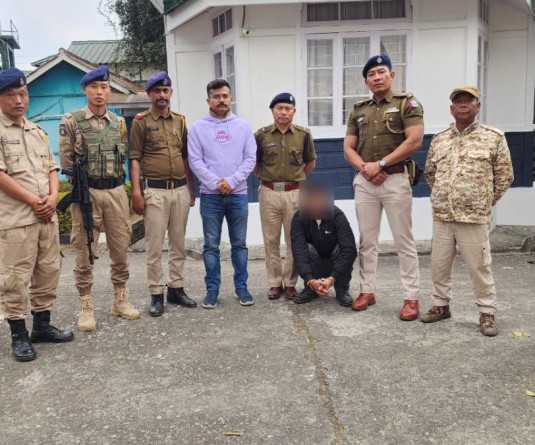
Nurses of Dimapur District Hospital sing the ‘Nurses Anthem’ on the occasion of International Nurse’s Day in Dimapur on Thursday, May 12. Also, the Local Branch Kohima of Trained Nurses’ Association of India (TNAI) successfully observed the occasion at the new complex of Naga Hospital Authority, Kohima (NHAK). (Morung Photo)
Kohima | May 12 : Nagaland along with the rest of the world today observed International Nurses’ Day under the theme “Closing the gap; increasing access and equity.” In the state capital, Local Branch Kohima of Trained Nurses’ Association of India (TNAI) successfully observed the occasion at the new complex of Naga Hospital Authority, Kohima (NHAK) with Kaisa Rio, lady wife of Chief Minister as the chief guest.
Speaking on the occasion, Kaisa praised the nursing community for their commendable services towards the health industry in the state. She said that medicines are required but the treatments that the nurses give to patients in the form of love, compassion, and care are very important aspects which brought about smile to many. She also stated that the Christian’s value of love, compassion and helping others is relevant to noble profession of nursing community. Also extending best wishes to all nurses, she also called upon the gathering to pay tribute to “Lady of the Lamp”- Florence Nightingale under whose birthday the International Nurses’ Day is celebrated.
Highlighting the theme of this year’s nurses’ day, Vikeyiekhole, principal tutor, School of Nursing, NHAK said that this year (2011) International Nurses’ Day theme “Closing the gap; increasing access and equity” strengthen our understanding of access and equity and the effect of inequality on health. “It outlines the barriers that exist and how we can increase access and equity. It also shines a light on the importance of the social determinants of health, demonstrating how nurses can address these and in doing so improve access and ensure equity in care provided,” she said.
Nagaland observes International Nurses’ Day
Nurses can play a vital role in enhancing access and equity. The International Council of Nurses (ICN) has the principles of human rights and equity as an integral part of nursing ethics, she said adding “This is affirmed within the preamble the ICN code of ethics for nurses which states that “inherent in nursing in respect of human rights, including cultural rights, the right to life and choice, to dignity and to be treated with respect.” Nursing care is respectful and unrestricted by considerations of age, color, creed, culture, disability or illness, gender, sexual orientation, nationality, politics, race…” she said. She also stated that nurses play important role in policy development through developing a voice in analysis advocacy and research, particularly within the domains of health service delivery and restructuring.
National nursing associations provide a means by which nurses interests can be articulated and provide a first point of contact with key stakeholders in government and civil society and are key to the development of an effective contribution to policy debates on both how the health system is oriented, structured and managed, but also on broader policy issues which address the social determinants of health, she said.
She added that nurses today face a great challenges to improve access to the health services.
“As nurses play an important role to health promotion, prevention and treatment of illness, they should work in partnership with the patient, self care groups etc. so as to ensue that both the patient and the public have access to appropriate information about health and its services,” she said. She also stated that it is also very important that nurses need to be involved in policy development and also to have effective linkages with relevant stakeholders to help ensure resource allocation and availability of services. To meet such challenges, she said, nursing education systems should be regularly updated and appropriately implemented.
In-service education of nurses should be provided to have up-to-date knowledge and skills so as to enable the nurse to deliver the accessible care which in turn promote equity, she said adding that recruitment of more clinical nurse specialists or nurse practitioners can help services more accessible to both the patient and the public ensuring that they received quality care at the same time reducing organizational costs.
Several dignitaries including MLA Dr. Nicky Kire, chairman Nagaland Khadi & Village Industries Board, ex-minister Seyiekuolie, commissioner & secretary for health and family welfare Menukhol John also graced the occasion.
Speaking on the occasion, Kaisa praised the nursing community for their commendable services towards the health industry in the state. She said that medicines are required but the treatments that the nurses give to patients in the form of love, compassion, and care are very important aspects which brought about smile to many. She also stated that the Christian’s value of love, compassion and helping others is relevant to noble profession of nursing community. Also extending best wishes to all nurses, she also called upon the gathering to pay tribute to “Lady of the Lamp”- Florence Nightingale under whose birthday the International Nurses’ Day is celebrated.
Highlighting the theme of this year’s nurses’ day, Vikeyiekhole, principal tutor, School of Nursing, NHAK said that this year (2011) International Nurses’ Day theme “Closing the gap; increasing access and equity” strengthen our understanding of access and equity and the effect of inequality on health. “It outlines the barriers that exist and how we can increase access and equity. It also shines a light on the importance of the social determinants of health, demonstrating how nurses can address these and in doing so improve access and ensure equity in care provided,” she said.
Nagaland observes International Nurses’ Day
Nurses can play a vital role in enhancing access and equity. The International Council of Nurses (ICN) has the principles of human rights and equity as an integral part of nursing ethics, she said adding “This is affirmed within the preamble the ICN code of ethics for nurses which states that “inherent in nursing in respect of human rights, including cultural rights, the right to life and choice, to dignity and to be treated with respect.” Nursing care is respectful and unrestricted by considerations of age, color, creed, culture, disability or illness, gender, sexual orientation, nationality, politics, race…” she said. She also stated that nurses play important role in policy development through developing a voice in analysis advocacy and research, particularly within the domains of health service delivery and restructuring.
National nursing associations provide a means by which nurses interests can be articulated and provide a first point of contact with key stakeholders in government and civil society and are key to the development of an effective contribution to policy debates on both how the health system is oriented, structured and managed, but also on broader policy issues which address the social determinants of health, she said.
She added that nurses today face a great challenges to improve access to the health services.
“As nurses play an important role to health promotion, prevention and treatment of illness, they should work in partnership with the patient, self care groups etc. so as to ensue that both the patient and the public have access to appropriate information about health and its services,” she said. She also stated that it is also very important that nurses need to be involved in policy development and also to have effective linkages with relevant stakeholders to help ensure resource allocation and availability of services. To meet such challenges, she said, nursing education systems should be regularly updated and appropriately implemented.
In-service education of nurses should be provided to have up-to-date knowledge and skills so as to enable the nurse to deliver the accessible care which in turn promote equity, she said adding that recruitment of more clinical nurse specialists or nurse practitioners can help services more accessible to both the patient and the public ensuring that they received quality care at the same time reducing organizational costs.
Several dignitaries including MLA Dr. Nicky Kire, chairman Nagaland Khadi & Village Industries Board, ex-minister Seyiekuolie, commissioner & secretary for health and family welfare Menukhol John also graced the occasion.






